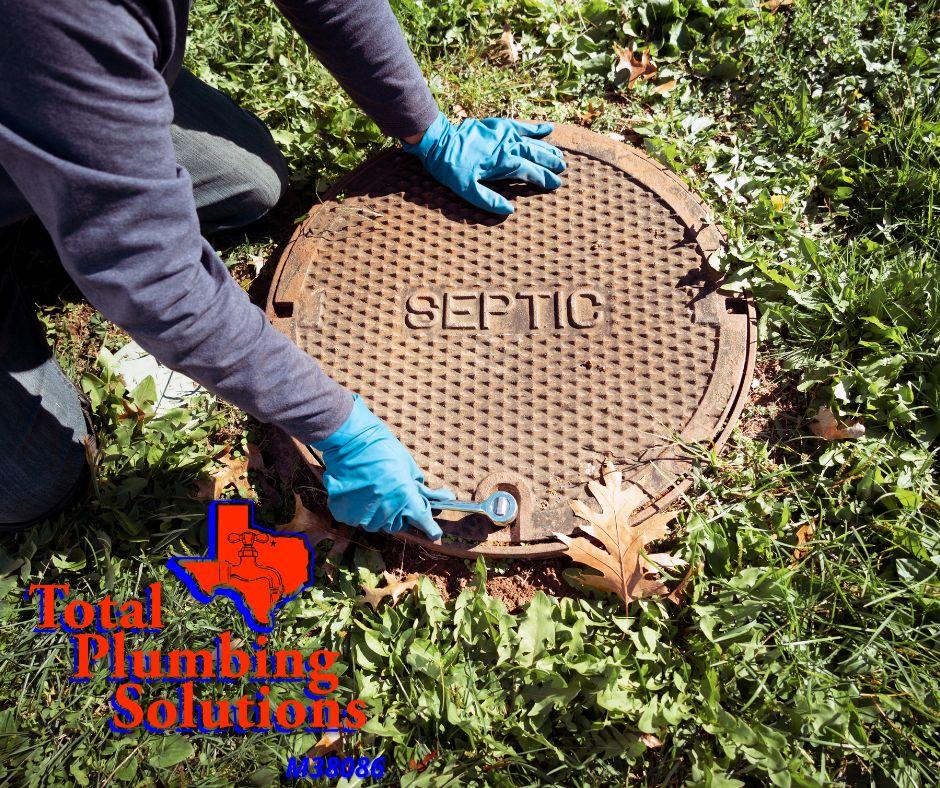
Septic System Essentials
Septic System Essentials: Maintenance Tips for Wise County Property Owners
For many Decatur and Wise County property owners, septic systems are an essential but often overlooked component of their plumbing infrastructure. At Total Plumbing Solutions, we find that well-maintained septic systems can function reliably for decades, while neglected ones can fail catastrophically, creating expensive emergencies and environmental hazards.
Understanding Your Septic System
Before discussing maintenance, it's helpful to understand the basic components and function of a typical septic system:
Main Components
Septic Tank: The large underground container that receives all wastewater from your property. Solid waste settles here, while bacteria begin breaking down organic materials.
Distribution Box: Directs the partially treated effluent from the tank to the drain field in a balanced manner.
Drain Field (Leach Field): A network of perforated pipes in gravel-filled trenches where final treatment occurs as water percolates through soil.
Soil: Acts as a natural filter, removing pathogens and nutrients before water rejoins the groundwater.
How It Works
When functioning properly, your septic system:
Separates solids from liquids in the tank
Allows beneficial bacteria to digest organic waste
Distributes clarified effluent to the drain field
Filters water naturally before it returns to the environment
This natural process requires balance and proper maintenance to function effectively.
Warning Signs of Septic Problems
Be alert for these indicators that your septic system needs attention:
Slow drains throughout the property: When multiple drains are sluggish, it often indicates a septic issue rather than a simple clog.
Gurgling sounds in plumbing: Unusual noises can signal that wastewater isn't flowing properly through the system.
Sewage odors: Foul smells indoors or outdoors near the septic components suggest problems.
Unusually lush grass over the drain field: Excessively green or fast-growing grass might indicate leaking effluent.
Soggy areas in the yard: Wet spots, particularly near septic components, often indicate a failing system.
Sewage backups: The most serious sign, indicating significant blockage or system failure.
High nitrate or bacteria levels in well water: Can indicate that septic effluent is contaminating groundwater.
Essential Maintenance Practices
Proper maintenance is far less expensive than emergency repairs or system replacement. Follow these guidelines to protect your investment:
Regular Pumping
The single most important maintenance task is regular pumping of your septic tank:
Frequency: Most residential systems need pumping every 3 years
Factors affecting frequency: Household size, tank size, garbage disposal usage, and water volume
Pumping process: A professional removes accumulated solids that bacteria cannot break down
Inspection opportunity: Pumping provides a chance for professionals to examine components
Daily Habits That Protect Your System
What goes down your drains significantly impacts septic health:
Conserve water: Spread out laundry loads, fix leaks promptly, and install water-efficient fixtures
Be mindful of what you flush: Only human waste and toilet paper should be flushed
Limit garbage disposal use: Food waste adds unnecessary solids to your tank
Choose septic-safe products: Use biodegradable, septic-safe cleaning products
Dispose of chemicals properly: Never pour paints, oils, medications, or harsh chemicals down drains
Protect Your Drain Field
The drain field is particularly vulnerable to damage:
Avoid driving or parking vehicles on the drain field
Don't build structures over the drain field
Redirect roof drains and sump pumps away from the septic area
Plant only grass over the drain field (tree roots can damage pipes)
Maintain proper grading to prevent water pooling over the system
Professional Maintenance Services
Beyond pumping, professional services that extend system life include:
Effluent filter cleaning: Prevents solids from reaching the drain field
Distribution box inspection: Ensures even distribution to all drain field lines
Outlet baffle inspection: Verifies proper flow from the tank to drain field
Line flushing: Clears buildup in drain field lines
System evaluation: Assesses overall condition and identifies developing issues
Septic System Lifespan and Replacement
Even well-maintained septic systems eventually need replacement:
Average lifespan: 25-30 years for conventional systems with proper maintenance
Replacement indicators: Recurring backups, failing drain field, contaminated water
Replacement options: Modern alternatives like aerobic treatment units may be suitable replacements
Permitting requirements: Local regulations govern septic installation and replacement
Commercial Septic Considerations
Commercial properties have unique septic needs:
Higher volume: Requires larger capacity and possibly different design
Specialized waste: Restaurants, salons, and other businesses produce waste requiring special handling
More frequent maintenance: Commercial systems typically need more frequent pumping and inspection
Regulatory compliance: Stricter monitoring and reporting may be required
The Total Plumbing Solutions Approach to Septic Care
Our comprehensive septic services include:
Thorough Inspection: We evaluate all components and identify potential issues
Regular Maintenance Programs: We create customized maintenance schedules based on your specific system and usage
Prompt Repairs: We address problems quickly to prevent escalation
Advanced Diagnostics: We use camera inspection and other technologies to pinpoint issues
Complete Documentation: We maintain records of all services for your reference
Protect Your Property and the Environment
A properly functioning septic system protects not only your property but also the surrounding environment and your neighbors' well-being. Contact Total Plumbing Solutions at (940) 627-4445 to schedule your septic system evaluation, maintenance, or repair.
Our experienced technicians serve residential and commercial properties throughout Decatur and Wise County, providing the expertise needed to keep your septic system functioning reliably for years to come.
